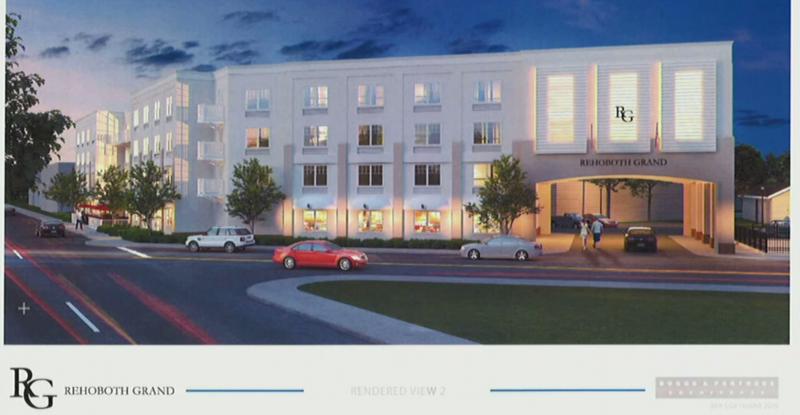To rezone or to not rezone? That is the question facing the developers of a proposed four-story hotel on Rehoboth Avenue.
Under the name Rehoboth Grand, Limitless Development Construction Consulting has proposed the construction of a four-story, 90-room hotel, with an indoor pool, underground parking, and retail and spa space on the ground floor. The hotel would be at 330 Rehoboth Ave., which is split-zoned – 23,067 square feet of C-1 commercial along Rehoboth Avenue and 19,425 square feet of R-1 residential along State Road. The State Road portion of the property is currently a parking lot.
Representing the construction company at a sketch-plan review before the Rehoboth planning commission Jan. 11, attorney David Hutt said a great effort was made during the design process to keep the configuration of the property the same. He said all the buildings and structures are along Rehoboth Avenue, while all the aboveground parking is on State Road.
As proposed, and mostly because of the commercial use of the R-1 zone, Hutt said this project would require a host of variances. Another option, he said, is to change the residential portion of the zone to commercial, and there isn’t any secret about how the applicant feels on that issue.
Limitless Development is a 99-year tenant at the property and is a branch of Milton-based Lockwood Design and Construction, which has an office in the Rehoboth Avenue building. Prior to Lockwood, the site was home for 15 years to Ocean Atlantic Sotheby’s, and, most famously, the Sea Horse Restaurant for many years. According to Sussex County property tax records, J.J. Stein III Inc. is the owner of the property.
Hutt said he spoke with a number of long time community members, and he said for as long as anyone can remember, that has been the configuration of the property. He said this means the residential portion of the property has always been a nonconforming use, because commercial parking isn’t allowed in that zone.
Hutt said the plan calls for a total of 92 parking spaces, 48 underground, below the hotel, and 44 above ground, where the current parking lot is. He said the height would be slightly taller than 41 feet.
Hutt said due to the age and condition of the building, the best use is to tear it down and replace it. He said his client would like to be hosting guests as soon as the 2021 season, which he also said he realized was an optimistic timeline.
Chief Building Inspector Damalier Molina said based on the split zoning, the site appears to have limited potential for the proposed use without variances or complete rezoning of the R-1 portion as C-1 commercial. He said he thought the site would help satisfy the growing demand for hospitality facilities in Rehoboth, but he also suggested requiring a traffic study, because the entrance is so close to the intersection of Rehoboth Avenue and State Road.
Describing it as haphazard, city solicitor Glenn Mandalas said he didn’t know when or why the split-zoning occurred, but the law generally favors cleaning it up when possible. He said the applicant may have a good case for rezoning the parking lot because across the street on State Road are VFW Post 7447 and the backside of Rigby’s Bar and Grill.
Commission Chair David Mellen said he is fundamentally against achieving construction designs through variances. Codes are written for a purpose, he said, and if codes are so wrong, they need to be revised.
All the other commissioners agreed with Mellen. Throwing out a word of caution, Commissioner Lee Weber said rezoning presents an all-or-nothing scenario, while the developer may get some of what he wants going down the variance route.
Public comment at the meeting was limited.
Sussex Street property owner Mark Betchkal cautioned that if the residential portion of the property is rezoned, it will always be commercial. What’s to say the developer wouldn’t come back in 5 to 10 years looking for more, he said.
Charlie Garlow, also a Sussex Street property owner, said he welcomed the hotel because the old auction place on Rehoboth Avenue is an eyesore. He suggested the developer should be as environmentally conscious as possible, with LEED certification, solar panels and good stormwater practices.
At the conclusion of the discussion, Hutt said he and his client appreciated the time, but did not give a timeframe for when they would make their next move.






















































